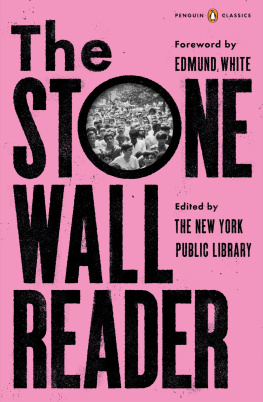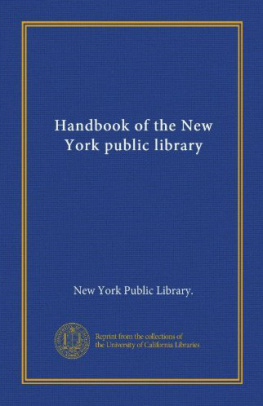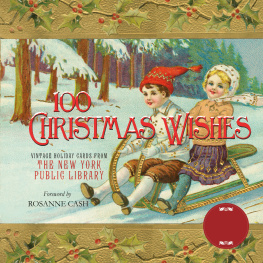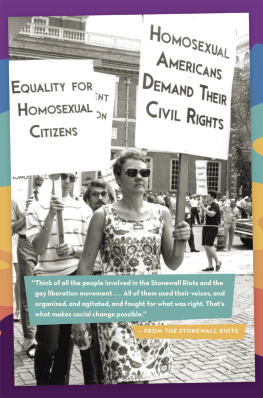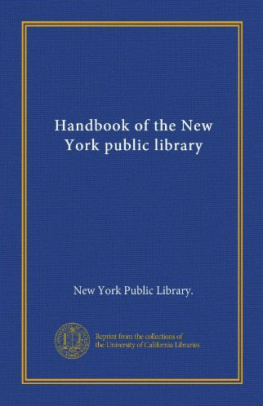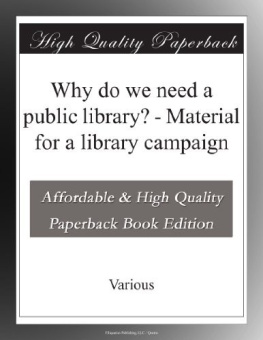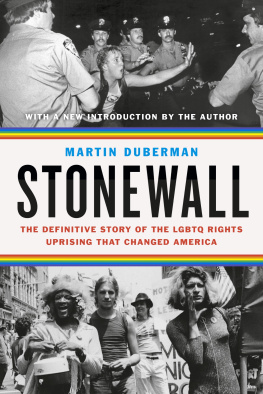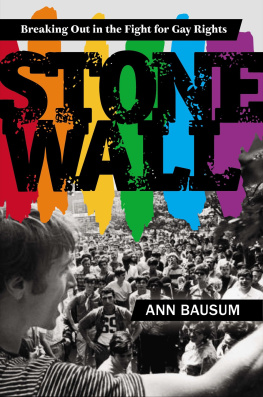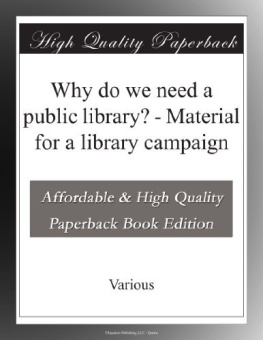New York Public Library - The Stonewall Reader
Here you can read online New York Public Library - The Stonewall Reader full text of the book (entire story) in english for free. Download pdf and epub, get meaning, cover and reviews about this ebook. year: 0, genre: History / Science. Description of the work, (preface) as well as reviews are available. Best literature library LitArk.com created for fans of good reading and offers a wide selection of genres:
Romance novel
Science fiction
Adventure
Detective
Science
History
Home and family
Prose
Art
Politics
Computer
Non-fiction
Religion
Business
Children
Humor
Choose a favorite category and find really read worthwhile books. Enjoy immersion in the world of imagination, feel the emotions of the characters or learn something new for yourself, make an fascinating discovery.
- Book:The Stonewall Reader
- Author:
- Genre:
- Year:0
- Rating:3 / 5
- Favourites:Add to favourites
- Your mark:
- 60
- 1
- 2
- 3
- 4
- 5
The Stonewall Reader: summary, description and annotation
We offer to read an annotation, description, summary or preface (depends on what the author of the book "The Stonewall Reader" wrote himself). If you haven't found the necessary information about the book — write in the comments, we will try to find it.
The Stonewall Reader — read online for free the complete book (whole text) full work
Below is the text of the book, divided by pages. System saving the place of the last page read, allows you to conveniently read the book "The Stonewall Reader" online for free, without having to search again every time where you left off. Put a bookmark, and you can go to the page where you finished reading at any time.
Font size:
Interval:
Bookmark:
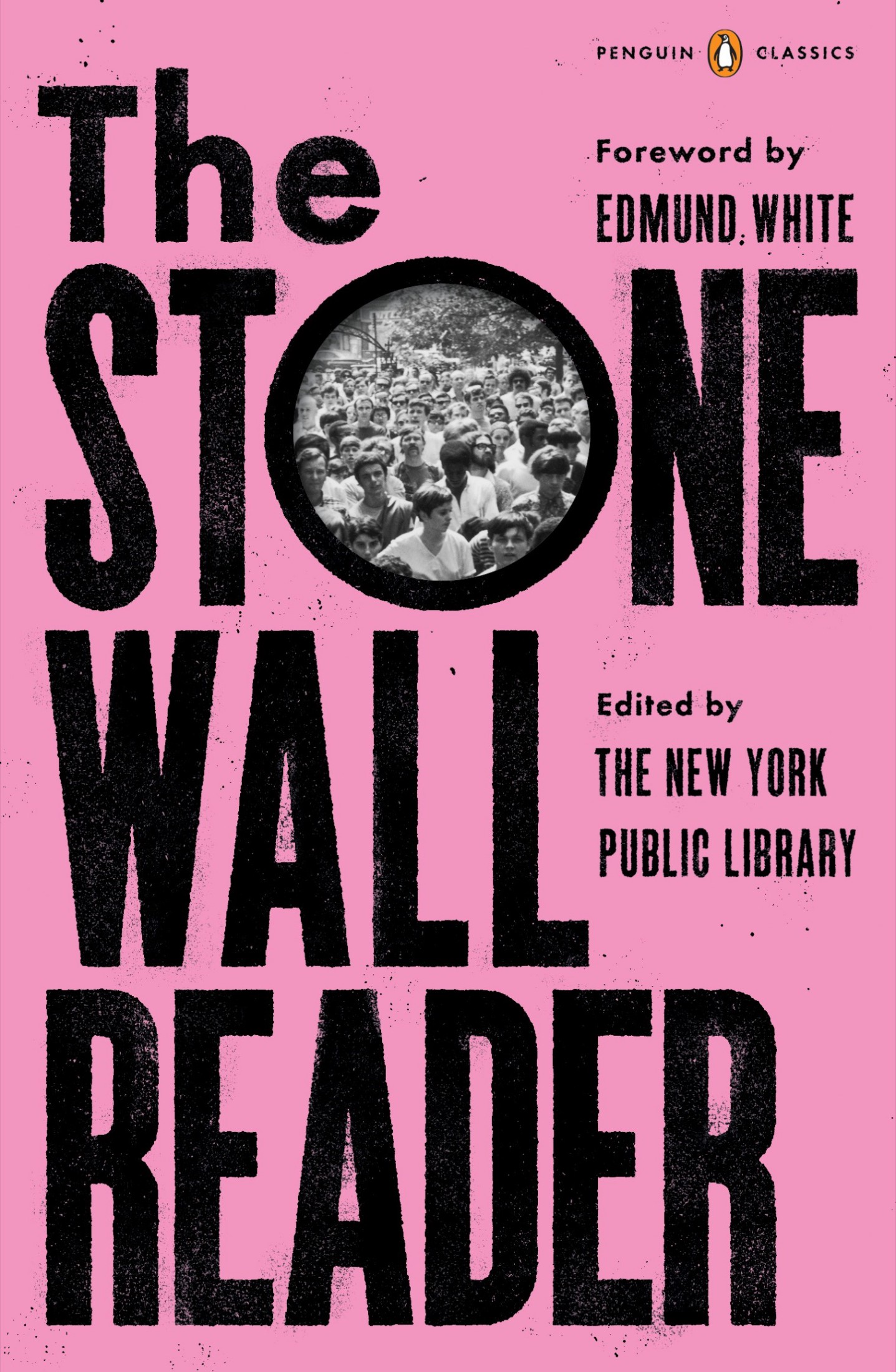
PENGUIN  CLASSICS
CLASSICS
THE STONEWALL READER
JASON BAUMANN is the Susan and Douglas Dillon Assistant Director for Collection Development for the New York Public Library and coordinates the librarys LGBT Initiative. His most recent exhibition is Love & Resistance: Stonewall 50. He received his MLS from Queens College, his MFA in creative writing from the City College of New York, and his PhD in English from the Graduate Center, CUNY.
EDMUND WHITE is the author of A Boys Own Story (1982), The Beautiful Room Is Empty (1988), and The Farewell Symphony (1997). He received a National Book Critics Circle Award for Genet: A Biography and won the 2018 PEN/Saul Bellow Award for Achievement in American Fiction.
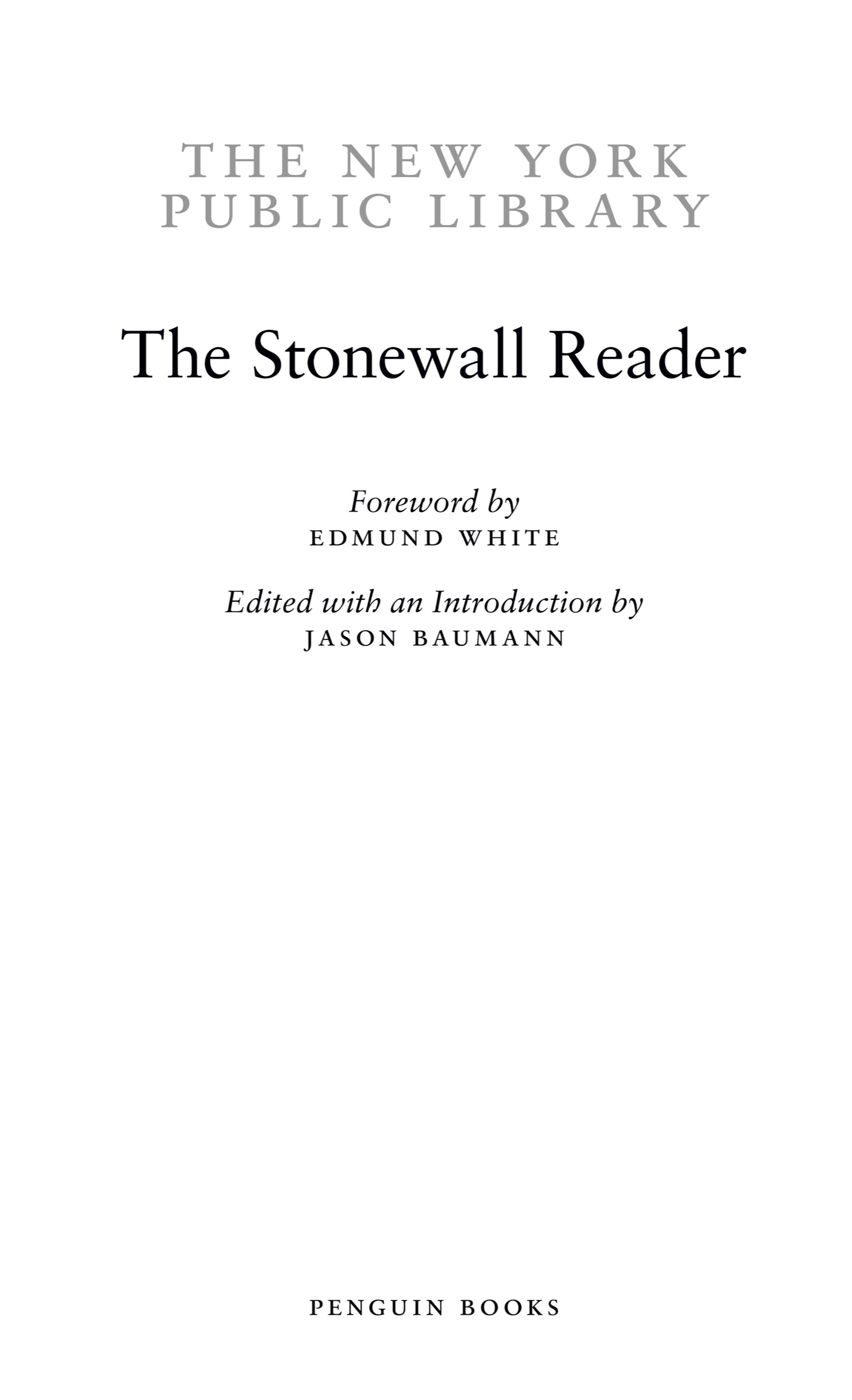
PENGUIN BOOKS
An imprint of Penguin Random House LLC
penguinrandomhouse.com
First published in Penguin Books 2019
Introduction, headnotes, and selection copyright 2019 by The New York Public Library, Astor, Lenox, and Tilden Foundations
Foreword copyright 2019 by Edmund White
Penguin supports copyright. Copyright fuels creativity, encourages diverse voices, promotes free speech, and creates a vibrant culture. Thank you for buying an authorized edition of this book and for complying with copyright laws by not reproducing, scanning, or distributing any part of it in any form without permission. You are supporting writers and allowing Penguin to continue to publish books for every reader.
constitutes an extension of this copyright page.
ISBN 9780143133513 (paperback)
ISBN 9780525505303 (ebook)
Version_1
THE STONEWALL READER
Theres something wonky and inappropriate about nearly every major protest event in history. The British inspired the Boston Tea Party because they wanted tax revenues to pay for battles theyd fought on behalf of their American colonies. When the French revolutionaries destroyed the Bastille, there were only seven prisoners in it, most of them aristocrats who came with pets, their own furniture, and hundreds of books. The Stonewall uprising protested a police raid on a Mafia-owned gay bar and dance spot that had no running water, where glasses were washed in filthy suds and reused, and which was protected by straight, extortionate Mafia goons.
But each of these uprisings came along at the right historical moment. Americans were fed up with taxation without representation. The French were protesting rising national debt, extremes in wealth and poverty, expensive foreign wars, and an autocratic government. And gays, whod almost never resisted arrest, stood up for themselves at last.
There were many causes of this historic resistance. Throughout the early 1960s the city had shut down gay bars out of deference to tourists visiting the Worlds Fair, which was mainly designed to showcase American business; the power behind it was the Tammany Hall mayor Robert Wagner. But at the time of Stonewall, in that pre-internet age that was the main place for queers to meet, it seemed gay and lesbian bars were being left in peace. Everyone assumed Mayor John Lindsay was a nice guy because he looked like Kennedy.
The clientele of the Stonewall had gradually changed from white to black and Hispanic, kids who were used to fighting the cops. And then it was very hot outside. And Judy Garland, the Pasionara of gay men, had died on June 22, 1969, from a Seconal overdose at age forty-seven and lay in state in Manhattans Frank E. Campbell funeral home. The Stonewall riots began June 28 at three in the morning. They went on for three days and at times the whole of Sheridan Square was cordoned off. Most important, the sexual revolution, Black Power, and antiVietnam War demonstrations had shown the efficacy of protest.
The United States had gradually shifted from espousing a morality of duty to a newfound yen for self-fulfillment. Gone or going were the days of sacrificing ones own pleasure for the sake of conventional values; typical of the sixties were alternative publications such as Screw and Hustler, which urged their readers to indulge their secret desires. The Kinsey Reports had already reassured people, straight and gay, how many adults had at least experimented with non-procreative sexeven kinky sex! Black Power had replaced the class analysis of the left with the race analysis of the civil rights movement. War protesters in the days of the universal obligatory male draft had inspired the majority to oppose a war we apparently couldnt win, that didnt serve our national interests, and that had become the killing fields of thousands of soldiers. And we were seeing how effective those protests could be. The burgeoning womens movement was showing that sisterhood is powerful, a preview of coming attractions in our American dialogue. Women prisoners locked up in the Jefferson Market prison (since razed) were shouting down their encouragement to the Stonewall protesters resisting the police.
Many if not most historians would argue that major events such as gay liberation are not sudden but gradual, incremental; as someone who lived through Stonewall I would claim that the uprising was decisive. Although there were small gay-rights groups such as the Mattachine Society (which first met under the name of Society of Foolsmattacino is the Italian word for a masked harlequin), most gay people (including this one) had hardly heard of them. Before Stonewall the prevailing theories of homosexualityeven among queerswere that we were sinners, criminals, or mentally ill. There was a certain moment at a gay cocktail party in the 1950s, for instance, when we would all put down our martinis and sigh, Gosh, were sick! I spent some twenty years on the couch trying to go straight and was assured by my various shrinks that homosexuality was just a symptom of a deeper disorder (oppressive motherabsent father was a favorite, or being arrested in the anal-aggressive stage). Almost no one could see queerness as something along the normal spectrum of human (or animal) behavior. The Mormons were making deviant boys look at homoerotica and then submitting them to shock therapy. Priests were listening to tearful confessions before consoling their little sinners. Many Protestant sects were sending their homosexual minors to boot camp for conversion therapy. Three states still ban all forms of sodomy (including oral and anal sex), even among heterosexuals; a 2003 Supreme Court decision decriminalized homosexuality even among consenting adults in fourteen states.
The Stonewall uprising changed attitudes, first among lesbian and gay people. In January 1970 I moved to Rome for six months, and when I came back cavernous gay dance clubs, complete with go-go boys in white towels under black light, had suddenly sprung up.
The Gay Academic Union started in 1973 and lasted four years. Gay political groups formed. Pride marches were held in scores of cities on the anniversary of Stonewall (as I write, were approaching the fiftieth anniversary). Same-sex civil unions and then marriages were legalized. Openly lesbian and gay volunteers were accepted into the armed forces. In many places discrimination against lesbians and gays in the workplace and in housing became illegal.
These rights are precious and were hard-won by generations of activists. But the change in attitudes is parallel and nearly as important. I was engaged twice, hurt my fiances, doubted all my impulses, feared a bitter and lonely old age (predicted on every side). Even today well-meaning heterosexuals lament that Im considered a gay author. (Would they be equally shocked by a Jewish or African American writer? Oh, no, sorry. Philip Roth and Toni Morrison are universal authors.) When I was a kid I knew very few gay couples, and no one would have sided with queers who wanted to adopt. When I worked for Time-Life from 1962 to 1970, I had to refer to my boyfriends as women; otherwise I would have been fired. My dad fired an employee because he was unmarried at thirty and wore cologne.
Font size:
Interval:
Bookmark:
Similar books «The Stonewall Reader»
Look at similar books to The Stonewall Reader. We have selected literature similar in name and meaning in the hope of providing readers with more options to find new, interesting, not yet read works.
Discussion, reviews of the book The Stonewall Reader and just readers' own opinions. Leave your comments, write what you think about the work, its meaning or the main characters. Specify what exactly you liked and what you didn't like, and why you think so.

